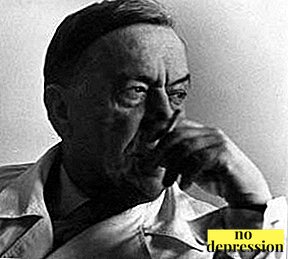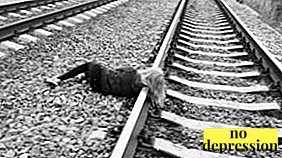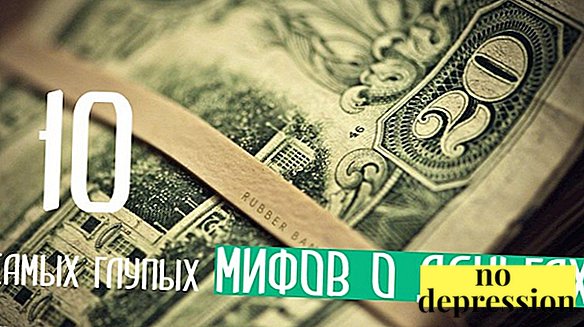One of the most common mental disorders is sluggish (low-progrediental) schizophrenia.
There are no pronounced symptoms in low-intensity schizophrenia, the patient has only indirect clinical signs and superficial personality changes.
Concept

What is sluggish schizophrenia? For the first time, the disease "sluggish schizophrenia" described Soviet psychiatrist A.V. Snezhnevsky.
In the future, scientists, describing the symptoms of this disease, used the terms: "latent schizophrenia", "mild schizophrenia", "pre-schizophrenia" and others.
All of these names imply a mental disorder characterized by slow course, lack of bright symptomscharacteristic of schizophrenic psychosis.
The patient hardly differs from healthy people and remains socially adapted.
So this kind of schizophrenia is transitional form, which does not imply the degradation of the individual, but is expressed in changes in behavior, interests, manners of communication.
History of psychiatry. Sluggish schizophrenia by Snezhnevsky in this video:
Causes
In medicine, the causes of this disease have not yet been identified. It is believed that most cases of schizophrenia have hereditary origin.
Among the factors provoking the pathology, noted long-term stress, mental trauma and lifestyle. At risk are residents of cities and unprotected layers of the population.

The psychotic condition occurs after the death of a loved one, illness, moving to another city and other stressful events.
However, the changes in the behavior of a person who has survived the tragedy of life are not associated with the manifestations of schizophrenia.
Establish a diagnosis can only be after a special psychiatric examination.
Symptoms and stages
Symptoms of the disease depend on the stage of its development. The first manifestations are noticeable. in adolescence they increase as the patient matures.
However, the boundary between a real disease and a temporary neurotic disorder is so vague that it can be extremely difficult to separate one from another.
The disease develops gradually, going through several stages:
- Latent. Her symptoms are very mild. The patient has long periods of unreasonable depression or joy, irritability, or apathy. This period begins in adolescence, when all the strangeness of behavior is perceived by others as age-related features. Often, a teenager becomes withdrawn into himself, refuses to go to school, communicate with parents.
 Manifest. This stage is characterized by an increase in signs that become visible to others. But the patient has no delirium or hallucinations, so his relatives do not turn to specialists, writing off all the symptoms on the nature of the character. The main manifestations are: panic attacks, paranoia, hysteria, hypochondria.
Manifest. This stage is characterized by an increase in signs that become visible to others. But the patient has no delirium or hallucinations, so his relatives do not turn to specialists, writing off all the symptoms on the nature of the character. The main manifestations are: panic attacks, paranoia, hysteria, hypochondria.- Stage stabilization. At this stage, the signs of mental disorder disappear, the patient's condition returns to normal. The last stage lasts a very long time, stretching for years.
Main symptoms, which can be suspected of developing the disease in its active phase are:
- Paranoid signs of impaired thinking.
- Hysterical behavior, the desire to attract attention, to cause admiration, to prove their case.
- Hypochondria, which is expressed in increased anxiety, obsessive states. Such patients find signs of a non-existent disease in themselves, believe that those around them hate them, etc.
- Asthenic manifestations: frequent mood swings, isolation, avoidance of communication with the outside world.
- Neurotic states. The patient has various manias, frequent changes of mood, phobias, anxiety.
With the development of symptoms increases. The patient becomes alienated, his mental abilities weaken.
Often these people are addicted to magic, religion, the occult. Gradually happening personality change, there are oddities in behavior, delusions.
 However, the person remains socially adapted, has a family and friends.
However, the person remains socially adapted, has a family and friends.
He is not able to adequately assess himself, is offended if he is considered strange.
Women are more likely to have depression or hysterical behavior; for men, schizophrenia manifests itself in the desire to be always right, to pay attention to themselves.
Female schizophrenia has paroxysmal character, men have a stable continuous course of the disease.
About the symptoms of sluggish schizophrenia in this video:
Types of pathology
In psychiatry, the following forms of sluggish schizophrenia are distinguished:
- neurosis-like form. This form is considered the most favorable in terms of treatment, as it has long periods of remission. The patient has phobias, fears, obsessive states. Appear suicidal thoughts. Such patients perform various protective rituals, involving a wide range of people;
 hypochondriacal form. Manifested in the obsessive idea of the presence of an incurable disease. In this case, the patient feels the signs of this disease, but cannot clearly describe them. He expresses his condition as “fire in the chest”, “the worm crawls in the stomach”, etc. He believes that doctors hide the diagnosis from him or cannot recognize a deadly disease;
hypochondriacal form. Manifested in the obsessive idea of the presence of an incurable disease. In this case, the patient feels the signs of this disease, but cannot clearly describe them. He expresses his condition as “fire in the chest”, “the worm crawls in the stomach”, etc. He believes that doctors hide the diagnosis from him or cannot recognize a deadly disease;- psychopathic form manifested in a change in personality. A person can commit acts peculiar to crazy people, but at the same time retains full responsibility. He expresses delusions, which, however, do not lose touch with reality.
Difference from neurosis
When making a diagnosis of "sluggish schizophrenia" should differentiate pathology from the neurotic state. Neurosis and schizophrenia have similar manifestations, so it is not enough to observe and collect anamnesis for diagnosis.
The main difference between neurosis and schizophrenia is that in neurotic conditions the patient’s personality does not change.
Main distinctive signs of neurosis:
- The presence of a stressful factor, after which stress begins, aggravating the patient's condition. Schizophrenia occurs without reason and suddenly.
- With neuroses, a person realizes that he needs help and is trying to get out of the situation. In patients with schizophrenia, critical thinking is absent.
- Neurosis is a reversible condition. In schizophrenia, the symptoms increase, personality changes are exacerbated.
Differential diagnostics

Despite the blurred signs of sluggish schizophrenia, psychiatrists can distinguish the ailment from simple nervous breakdown.
To this end, special diagnostic methods have been developed in psychiatry.
They are to conduct mental and neuropsychological tests, the results of which the doctor accurately determines the presence of pathology.
The diagnosis is supported by MRI. The pictures will show brain pathologies that trigger the development of schizophrenia.
If a hereditary factor is added to the positive results of the study, the diagnosis leaves no doubt.
Schizophrenic or neurotic? Differences in this video:
Treatment
Sluggish schizophrenia, although it has mild symptoms, but requires treatment. With timely therapy prognosis favorable.

For the treatment of the disease prescribed drugs.
They are appointed in smaller dosesthan with other mental illnesses, but regular long-term administration is required.
Drug therapy Schizophrenia involves the use of such agents as:
- neuroleptics. Designed for the treatment of mental disorders, they suppress the productive symptoms;
- psychostimulants. Activate mental processes, restore thinking, memory, motivation;
- antidepressants. Used to treat depression. Contribute to improving mood, relieve apathy, anxiety, irritability;
- nootropics. These are drugs that increase cerebral circulation, improve processes in the brain, stimulate its activity;
- tranquilizers. Relieve anxiety, eliminate panic attacks.
In addition to drug therapy, for the treatment of patients apply various trainings that improve social adaptation. Patients should engage in creativity, attend cultural events.
Forecasts
Sluggish schizophrenia with timely and correct treatment has a favorable prognosis. Sick can adapt in society, perform professional duties.

If you follow all the recommendations of doctors, you will be able to achieve long-term remission, eliminate the negative manifestations of the disease.
It is important to protect the patient from stressful situations, maintain it.
Sluggish schizophrenia is not the most difficult mental illness.
So that she does not go into the advanced stage, it is important to diagnose the disease in time and prescribe adequate treatment.

 Manifest. This stage is characterized by an increase in signs that become visible to others. But the patient has no delirium or hallucinations, so his relatives do not turn to specialists, writing off all the symptoms on the nature of the character. The main manifestations are: panic attacks, paranoia, hysteria, hypochondria.
Manifest. This stage is characterized by an increase in signs that become visible to others. But the patient has no delirium or hallucinations, so his relatives do not turn to specialists, writing off all the symptoms on the nature of the character. The main manifestations are: panic attacks, paranoia, hysteria, hypochondria. hypochondriacal form. Manifested in the obsessive idea of the presence of an incurable disease. In this case, the patient feels the signs of this disease, but cannot clearly describe them. He expresses his condition as “fire in the chest”, “the worm crawls in the stomach”, etc. He believes that doctors hide the diagnosis from him or cannot recognize a deadly disease;
hypochondriacal form. Manifested in the obsessive idea of the presence of an incurable disease. In this case, the patient feels the signs of this disease, but cannot clearly describe them. He expresses his condition as “fire in the chest”, “the worm crawls in the stomach”, etc. He believes that doctors hide the diagnosis from him or cannot recognize a deadly disease;

